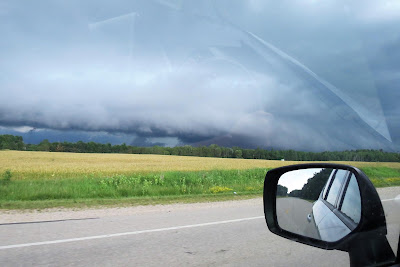Reading a book of folklore and mythology the other day, I came across not one but two older stories of similar occurrences. In one, an Arabian chieftain is enticed by a sorcerer to look deeply into a pan of water. The image of a town begins to form and before he knows it, the chieftain has washed up on a beach in front of that settlement. A young woman greets him and before long they are married and having children, living prosperously in the town. Years pass, the man's wife dies, his children grow, and he wanders to the beach. The waters engulf him and in a flash he has returned to his chieftain throne, the sorcerer standing before him, with only seconds having elapsed.
Hebrew mythology contains a similar story of King Solomon.
We are told that one day Solomon was playing a game with Asmodeus, king of the demons. To make a point, Asmodeus weaves a spell around Solomon. transporting him to another land where he must live as a poor beggar. He meets a woman, gets married, and works his way back up in the world, but is eventually drawn back to his game with Asmodeus. Thinking he was gone for decades, he roars at the demon who demurs that the king had never gone anywhere and only a moment had passed.
In India, in the Yogavasishtha, there is the story of the sage who saw inside the mind of a hunter and got lost there, becoming the hunter, who then became a sage, while years and years seemed to pass, though little time had actually transpired at all.
Where do these stories from around the world come from? Is it from the experience of very vivid dreams that seem so real and so expansive, but are just passing moments in our slumbering minds, and we awake with a jolt to the world we know? Or, is the mind capable of creating a whole other world, as one man claimed happened when he suffered a concussion? In that story, and in the thread on the Fortean Times website about the supposed incident, a man claims to have been hit in the head and while unconscious accumulated years and years of memories of having married and started a family. It all evaporated when he was put into a squad car to go to the hospital to be treated for his injury.
Can such experiences really happen, or are these stories just mythic expressions of our attempts to deal with the fogginess of time, the gossamer-like quality of dreams, and our sometimes tenuous grasp of reality? Besides Star Trek's "The Inner Light," there are other well-known popular culture treatments of these ideas, like the movies Inception and The Matrix. Examples of humans considering these occurrences stretch back a long ways, but what does it all mean? The Star Trek episode's title, "The Inner Light," comes from a 1968 Beatles song written by George Harrison as a B-side to "Lady Madonna." Perhaps the song can lend a clue.
Though the instruments are meant to be evocative of Indian music, the lyrics are straight out of a chapter of the Chinese Daoist work Dao De Ching: "Without going out of my door / I can know all things of earth. / Without looking out of my window, / I could know the ways of heaven. / The farther one travels, / The less one knows."
These lines express the Daoist sensibility that all people, and all things for that matter, are perfect as they are and have no need of outside correction or development. The world within is all you need.
These stories across culture, time, and medium could be seen as reinforcing the Daoist idea that, despite the seeming smallness of our craniums, there are entire worlds and teeming dimensions to be found within us that stagger space and stretch mere minutes into lifetimes. Picard's interior experience of the passing of an entire life on another world opened him up to an existence (i.e., marriage, family) that he had not considered. One could argue that the greatest distance he ever traveled was without ever leaving the ship. All he really needed to do was look within himself. Perhaps that is a lesson for all of us. To quote from another Beatles song, "The movement you need is on your shoulder."
That's all for now. In upcoming blogs, you can expect a discussion on the Asian philosophical influences on Walt Whitman, the status of Harry Potter as an "epic" figure, and much, much more.
Until then, take care.























